Déjà Vu
 for intense sequences of violence and terror, disturbing images and some sensuality.
for intense sequences of violence and terror, disturbing images and some sensuality.
Reviewed by: Michael Karounos
CONTRIBUTOR
| Moral Rating: | Average |
| Moviemaking Quality: |
|
| Primary Audience: | Adults |
| Genre: | Suspense Sci-Fi Thriller Action Adventure Crime Romance |
| Length: | 2 hr. 8 min. |
| Year of Release: | 2006 |
| USA Release: |
November 22, 2006 (wide) |
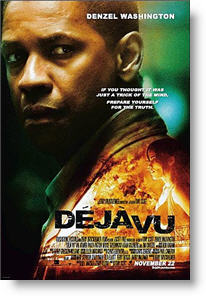
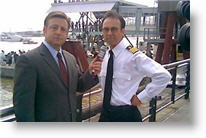

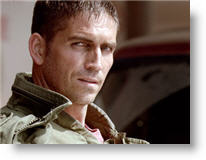
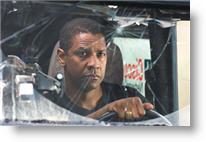
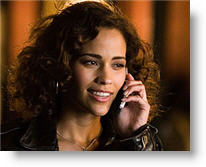
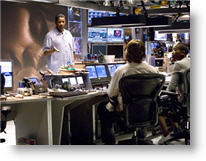
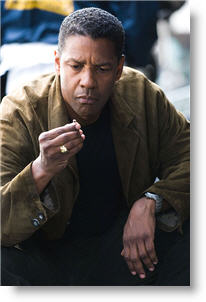
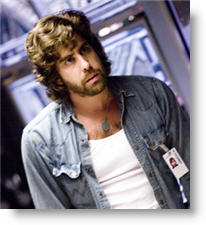

| Featuring |
|---|
| Denzel Washington, Val Kilmer, Paula Patton, Bruce Greenwood, Adam Goldberg |
| Director |
|
Tony Scott |
| Producer |
| Mike Stenson, Chad Oman, Terry Rossio |
| Distributor |
| Buena Vista Pictures |
“If you thought it was just a trick of the mind, prepare yourself for the truth.”
“Déjà vu” is about ATF agent Doug Carlin’s (Denzel Washington) quest through time to save the beautiful and dead Claire Kuchever (Paula Patton) from being murdered. The person who does the murdering is terrorist Carroll Oerstadt (James Caviezel) who blows up a ferry in New Orleans harbor containing 543 American servicemen and their families, all of whom, remarkably, are hugging and smiling in slow motion up until the moment of their deaths.
In order to catch the terrorist, Agent Carlin must join forces with the FBI and use a machine called “Snow White,” which is described as the same spying technology the army uses in Iraq and which, Shanti informs him, “can access any surveillance technology available to any government agency.” The whole sequence reeks of Patriot Act dementia, which, together with the repeated reference to Oklahoma City, government neglect of New Orleans, and the war in Iraq, combine to overwhelm the dramatic premise and makes it obvious that the movie is trying hard to disguise its political attacks under cover of an action movie.
This deceit works about as successfully as it did in movies like “Timeline” (2003), and “The Jacket” (2005) which are also supposedly about time travel, but whose underlying points are that America is responsible for the spread of weapons of mass destruction (“Timeline”), and that returning American soldiers have been psychologically damaged by their supposed crimes in Iraq (“The Jacket”). Similarly, the latest “Mission Impossible” demonstrates that the spread of weapons of mass destruction is not through Pakistan and North Korea, as is well-documented, but is actually conducted by rogue elements in the American government working through Crusader elements in the Vatican.
Such plots have nothing in common with the daily news and show Hollywood’s obsession to project guilt on the United States for actions committed by others. The movie’s perfect example of this is the terrorist who uses a vehicular IED directed against American troops. This sort of thing is in the news everyday. But for Hollywood, reality cannot interfere with ideology. Thus, the terrorist can never be a Muslim who is blowing up American troops and innocent (9/11 or Iraqi) civilians, because that would be politically awkward. Instead, the terrorist must be white because the terrorist who set off the Oklahoma City bombing was white.
Additionally, the terrorist has to be someone who dresses in military casual, tried to join the army, and prominently displays a “SUPPORT THE TROOPS” sticker on his desk drawer. As an added detail, his last name, “Oerstadt,” must suggest a Dutch Afrikaaner lineage that would support the implicit premise of apartheid racism. Finally, he must be called a “patriot” several times so that we get the point. The rule of moviemaking is three: repeat a theme, an image, an idea three times in three different contexts to get the message across. The logic of such a villain in such a time as ours is inescapable from a certain political perspective. Freud called it projection.
As concerns the much-criticized logic of the time travel premise, I can think of no better way to explain it than to mention that co-writer Bill Masilii’s two previous screenplay credits are for episodes of “Courage the Cowardly Dog” and “The Wubbulous World of Dr. Seuss.” The movie could have been titled “The Wubbulous Wormhole” and have made just as much sense. Clearly, the point of the movie is not so much to explain the plausibility of time travel, as it is to indirectly implicate and punish the American military for fostering a climate of false patriotism that gives birth to monsters like Carroll Oerstadt.
The movie suffers from a number of manipulative tricks, like the repeated use of slow motion mentioned above. There is the additional heavy-handed use of cue music to suggest tragedy or a nostalgic moment. There are also too many melodramatic speeches in which Doug Carlin self-righteously mocks his conspicuously white counterparts or, alternatively, explodes in anger at them.
In fact, the most déjà vu moment the movie elicits is the repeated sense of race-pandering that a number of Denzel Washington’s recent movies express. The black characters are all noble, intelligent, and principled, while the white characters are either fat, cynical, or voyeurs. This same disturbing characteristic is evident in Washington’s previous movies such as “The Manchurian Candidate” (2004) and “Inside Man” (2006). In this movie, the viewer is treated to footage of the devastated 9th ward of New Orleans (the black ward) as a radio broadcasts commentary about the poor government response. The white time managers look on a naked black woman with undisguised lust, while the black man and black woman scold them. The white time manager is called a “traditionalist” while the black time manager is called a “radical” and so on.
Additionally, excepting the Jewish character played by Adam Goldberg, there are three black characters who either pray to God or talk about God (though not about Jesus). As a Christian, I would ordinarily be grateful for such a positive portrayal of putative Christians, but this racial coding of Christians as only black smacks of calculated hypocrisy and strikes the viewer as being patched on for political purposes, to appeal to conservative black viewers, and to show them that they and Hollywood have a common enemy in the government and white patriots.
The racial coding even descends into the lower levels of humor when the movie situates the bombing on Fat Tuesday and then portrays, within a matter of minutes, no fewer than four fat white investigators. Just so we don’t miss the point, the last one is identified as an Agent Hendrix who we are forewarned is showing “the crack in his _ _ _.” The audience is then shown a close-up of the poor actor’s hairy behind to elicit a cheap laugh which director Tony Scott had to struggle mightily to insinuate into the plot. Although that was supposed to be a humorous moment in the movie, it is another of those disturbing racial “gotcha” moments that seems to be directed at a black audience. Throughout the sequence, the clear message is that stupid, fat white men are incompetent, don’t know where the coffee maker is, eat too much, and are disgusting, in approximately that order.
Ultimately, the movie leaves the viewer with the message that: 1) the terrorists in our world are white “patriots”; 2) the government is spying on everyone; and 3) black people are being neglected by a government that is (choose one or all) lazy, incompetent, or criminally insensitive. What Déjà vu is not about, is time travel. As in “Timeline” and “The Jacket,” time travel is just a premise to make a political point.
For Denzel Washington fans who don’t mind the political subterfuge, the movie may be worth seeing. Aside from one scene of brief nudity and Agent Hendrix’s rear end, there are no objectionable elements besides the political ones. Conversely, if you happen to think that white American “patriots” are indeed the source of terrorism and, like Kanye West, believe that Bush and Company disdain black people, then this movie is for you.
Lastly, Christian viewers will nonetheless get a fleeting gratification from the brief discussion of fate, God’s will, and Agent Carlin’s statement to the effect that “Satan reasons like a man, but God reasons for eternity.” Had the movie treated the idea of time travel as a metaphysical enigma, it would have been an interesting exercise in the tension between faith and science. Unfortunately, Tony Scott and the writers tried to squeeze too much into the script and confused the movie’s focus. Perhaps it is fitting that one of the signature images the movie leaves in viewer’s minds is Agent Hendrix’s rear end.
Violence: Heavy / Profanity: Minor / Sex/Nudity: Minor


Better than Average / 4
Otherwise, this movie opened up so much discussion about the sovereignty of God—that’s ALL we were talking about afterwards, and this movie would be a great to take unbelieving friends to and talk over coffee afterwards. It’s definitely a movie that makes you think and has you going “OH!” and “I get it now!” pleasantly through the whole movie.
I don’t see race being as big or negative an issue as the reviewer made it to be. Being black myself, seeing black characters who weren’t acting violently, ignorantly, or vulgarly like in a lot of movies was a *nice* change of pace in a mainstream movie. Other white characters, such as the main scientist, were shown as intelligent and he had a few good lines of his own. I enjoyed it—I wouldn’t let the official review steer you away from this film.
Average / 4½
Good / 5
There is hardly any profanity at all; maybe 2-3 uses. Extremely clean language-wise; especially compared to Denzel’s last movie “Hit Man,” which had an major overload of extreme profanity. I give this movie a 7½-8.0 on a scale of 1 to 10. A good video overall.
Average / 4½
Better than Average / 4½
Better than Average / 4½
Such an analogical interpretation gives Christian viewers a point of reference, but as a method it should never be confused for analysis. Every point in the review is based on the dialogue, images, or characterization within the movie. It is understandable that different viewers may disagree about an interpretation, but it is impossible to refute the references since they come from the movie and were not made up.
Viewers must decide for themselves, but they should do so on the basis of the internal evidence and be careful not to project their own faith onto a secular canvas. Christians often make the mistake of thinking that a theme, such as redemption, for instance, makes a movie “Christian.” It does not. Redemption is not an exclusively Christian theme.
Lastly, every film is governed first and foremost by its market appeal. Films starring Adam Sandler or Julia Roberts or Denzel Washington appeal to distinctively different demographics. It is only natural that a film starring an African-American will emphasize material that appeals to an African-American audience, like the references to Katrina and the devastation of the 9th Ward. Spike Lee films, for example, target African-American audiences, while Oliver Stone films target left-leaning audiences. To not know this is to be naive about how Hollywood operates.
Average / 3
Blacks and Whites do have different cultural world views, but this movie doesn’t pit one against the other to find it’s ground. Remember the main character is not portrayed as a Christian, but he wasn’t anti-white either, this isn’t a Spike Lee movie (I generally have a strong dislike for Spike Lee’s political agendas). Don’t be afraid to let your older teenagers see this movie, trust me they won’t turn into raging liberals and hate white people, the movie isn’t that deep.
Average / 4
Better than Average / 3½
I also have no idea what the reviewer is talking about re: attacks on the US and military. I would consider myself aware of those issues and under-handed attacks… but either the plot was too engrossing or the attacks were so veiled that they were only hinted at… but either way I didn’t even notice and thinking back cannot really recall anything of that nature. I recommend this movie hesitantly—mostly to females who enjoy action and don’t mind a little sci-fi… and I’d recommend that any male going, look away for that scene of blatant voyeurism.
Average / 4½
Offensive / 3½
Better than Average / 2½
Average / 4½
Average / 3½
There is a shower voyeurism scene where it completely shows a woman’s breasts and behind. To say the least, I was very upset. If I had known that would be in the movie, I wouldn’t have seen it. Other than that, it was a great movie. Why does Hollywood always have to throw that junk in a good movie?
Extremely Offensive / 3
Offensive / 3½
Moral rating: Offensive / Moviemaking quality: 3
1.) The shooting/explosives. But I guess that was all a part of a movie like this.
2.) The few swear words. (But, I hear more at school.)
3.) The bra scene when they are first in Claire’s house. I wouldn’t feel comfortable watching this part with any of my guy friends. The supposed “nude” scenes were not at all visible. No, you could not see her bare breasts or her bum. After seeing this as many times as I have I think I would know. However, that doesn’t mean I wasn’t uncomfortable with the comments that the men were making.
4.) The drug reference- 'This was a bad week for me to stop snorting hash.'
Here is a longer list of things that I did like:
1.) I loved the weird car scene where Doug was using the device to track the man so they didn’t go out of range.
2.) I loved it how Claire prayed and how she didn’t have any sinful behavior .Therefore, I assumed that she was a christian.
3.) I loved the suspense, the feeling of wondering what was going to happen.
4.) I loved it how everything came together—like when the agent asked Doug if he completely forgot how to investigate a crime scene and said that his fingerprints were found everywhere. You find out later that it was because he was with her in her house.
5.) I love it that all those human lives were spared because of the invention and because of Doug.
6.) I loved the feeling at the end when Claire thinks Doug is dead but he is really alive. The other him anyway. It is really an amazing feeling that brings me to tears.
The bottom line is, I will buy this movie and I will watch it over and over. When a movie is bad I will feel convicted to not watch it anymore and so far I have felt good at every ending. …
Excellent! / 5
I am a conservative, and while there were a little political slants, I was not offended by them to such a degree as Mr. Karounos. I think that we need to judge films, TV, music, magazines, etc, strictly on a moral basis from a Christian, biblical perspective. …I strongly disagree with Mr. Karounos' statements…
My Ratings: Average / 4½